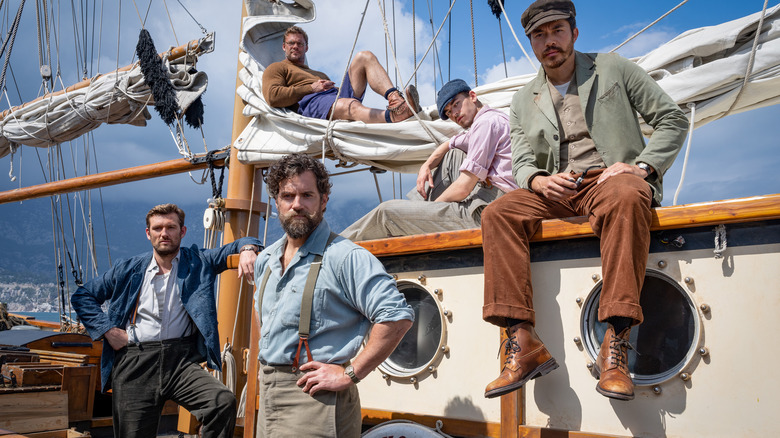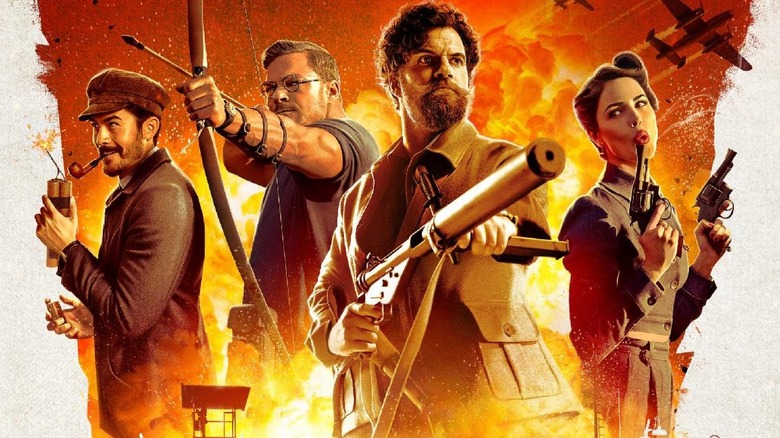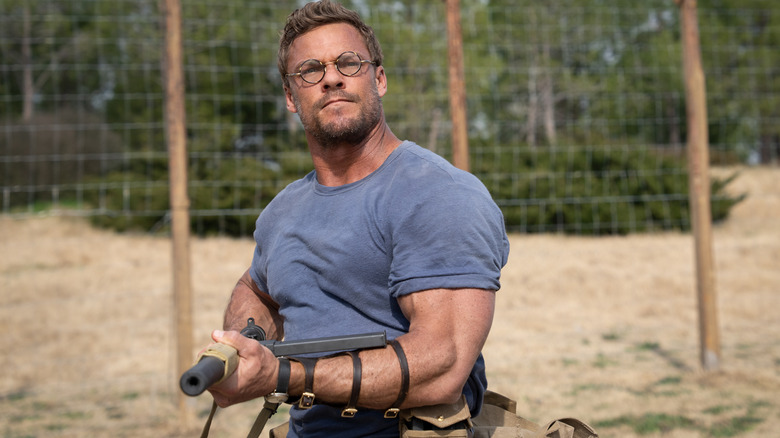The Ministry Of Ungentlemanly Warfare Review: Alan Ritchson Steals A Fun, Forgettable Movie
There's nobody quite like Guy Ritchie. One of the notable directors who has repeatedly dipped toes in both extremes of the budgetary pool, his unmitigated success with early features like "Lock, Stock and Two Smoking Barrels" and "Snatch" eventually gave way to blockbusters on the level of "Sherlock Holmes" and "King Arthur: Legend of the Sword" — all bearing his unmistakable fingerprints as much as his various mid-budget efforts do, which recently span five total films in the last five years (and even a television series, too, for good measure). Though perhaps not considered a household name among the most casual of moviegoers, chances are high that the hardworking Ritchie's brand of rapid-fire editing, roguish characters with snappy dialogue, and oh-so-English humor (humour?) are instantly recognizable on some level, at least.
Yet that's perhaps the same reason why "The Ministry of Ungentlemanly Warfare," his newest World War II action/comedy loosely based on historical events (as adapted from author Damien Lewis' book and its mouthful of a title, "The Ministry of Ungentlemanly Warfare: How Churchill's Secret Warriors Set Europe Ablaze and Gave Birth to Modern Black Ops"), feels jarringly at odds with both itself and Ritchie's own filmography.
All of his usual hallmarks are present and accounted for on the surface, particularly in the half of the film that plays out like a breezy caper. There's the alternately suave and hard-edged lead character Major Gus March-Phillipps (a hilariously unhinged and gruffly bearded Henry Cavill), based on the real-life figure commonly thought to have inspired Ian Fleming's James Bond. Then there are entire sequences that playfully riff on wartime classics like "Casablanca" and Quentin Tarantino's "Inglourious Basterds," putting a modern and irreverent spin on its throwback touchstones. Ritchie even relies on his usual penchant for flashbacks and non-chronological storytelling, though this is quickly dropped after a tone-setting cold open on a yacht that involves "Reacher" star Alan Ritchson (playing the hulking Anders "The Dutch Hammer" Lassen) affecting a Swedish accent, painting the deck with Nazi blood, and immediately positioning himself as the film's runaway MVP.
All of this works well enough in service of a comedic, low-stakes, and frequently enjoyable romp that regards Nazi soldiers as buffoons and its central men on a mission as unstoppable (and impossibly charismatic) killing machines. All that's missing, really, is a sequence where Gus and his team kick down a bunker door, deliver one final "Screw you!" to historical accuracy, and gleefully pump Hitler full of lead. Honestly, that might've made for a better film. Underneath, however, it's as if Ritchie can't fully decide which tonal lane he wants to stay in: something closer to the self-aware silliness of "The Man From U.N.C.L.E.," or an Important Historical Drama (complete with ending title cards regaling the feats of the real-life heroes) that grandly gestures towards — but flinches away from — its darkest implications.
Taken as a whole, "The Ministry of Ungentlemanly Warfare" is ultimately a movie of what-ifs and missed opportunities ... even if there's plenty of joy to be found in Ritchson singlehandedly massacring bad guys with little more than his bulging muscles, a bow and arrow, and the greatest pair of adorably tiny glasses since Dave Bautista's in "Blade Runner 2049."
Men (and one underserved woman) on a mission
In the early going, the plot follows the familiar (if well-worn) playbook of "The Magnificent Seven" and countless other getting-the-team-together adventures. As German U-boats wreak havoc throughout the Atlantic Ocean, preventing the United States from entering the war in earnest and all but ensuring a resounding European surrender to fascism, British Prime Minister Winston Churchill (a nigh-unrecognizable Rory Kinnear, bellowing orders while buried under prosthetics and makeup) concocts a scheme codenamed Operation Postmaster: a ragtag team of agents will slip behind enemy lines and literally blow up the U-boat supply chain. The target? The Casablanca-like port of scum and villainy located on the Spanish island of Fernando Po, neutrally positioned between political lines. This just so happens to be where the Italian vessel Duchessa, the main supplier of the U-boat fleet and their main objective, is currently anchored. Obviously, the only people for the job are the formerly incarcerated Major Gus-March, his motley crew of ne'er-do-wells, and two smooth-talking agents on the inside.
It's fair to say that this based-on-a-true-story premise of a renegade team embarking on the first black-ops mission in modern warfare might as well have been tailor-made for the director's sensibilities. Unfortunately, even an ensemble cast as strong as this one, bolstered by a scene-stealing performance as effortlessly compelling as Ritchson's, can't entirely make up for a script (credited to Ritchie and co-writers Paul Tamasy, Eric Johnson, and Arash Amel) that struggles to find a common thread between a trio of distinct storylines.
At times, the experience of watching "Ungentlemanly Warfare" comes across as pivoting between three films in one. The swaggering antics of Cavill's Gus, Ritchson's Anders, Geoffrey Appleyard (Alex Pettyfer), Henry Hayes (Hero Fiennes Tiffin), and Freddy Alvarez (Henry Golding) is by far the most effective of the bunch. Meanwhile, the behind-the-scenes drama between Churchill, Cary Elwes' Brigadier Gubbins (an obvious inspiration for "M" in the Bond franchise), and Ian Fleming himself (Freddie Fox, who is given the indignity of introducing his character as "Fleming, Ian Fleming" in an apparent hate crime against subtlety) ends up too disconnected and compartmentalized from the main action to ever really invest in. Finally, the extended "Casablanca" homage in Fernando Po revolving around Babs Olusanmokun's Rick Blaine stand-in/undercover casino owner Richard Heron and Eiza González's secret agent Marjorie Stewart disarming the suspicions of main villain Heinrich Luhr (Til Schweiger, whose self-referential casting is a bit on the nose) at least provides a certain amount of tension and stakes.
But even this is saddled with some of the film's most clichéd (yes, Ritchie puts a hat on a hat by having a character directly quote "Casablanca" for those who didn't already get it) and — in González's case, whose narrative function essentially boils down to seducing a Nazi — borderline regressive tropes.
We'll always have Alan Ritchson (and his tiny glasses)
None of this is to imply that "Ungentlemanly Warfare" is a complete swing and a miss, by any means. Ritchie and his creative team (many of whom have worked on his films before) are clearly operating on the same page and display a deep understanding of their shared goals, bringing together a collaborative vision that hearkens back to the studio filmmaking system of Hollywood's heyday. Verisimilitude is the name of the game here, from visceral scenes set in the open ocean which would feel right at home in "Master and Commander" to tangible production, set, and costume design (shout-out to artists Martyn John, Rebecca Gillies, and Loulou Bontemps, respectively) that work hand-in-hand with the VFX teams to sustain a lived-in atmosphere and set this film apart visually from most of its contemporaries.
Ironically enough, what makes this film an occasionally frustrating watch is the stacked deck otherwise working in its favor. Ritchie has rarely struggled to assemble talented ensembles full of genuine movie stars — the yeomen work of Olusanmokun, González, Danny Sapani, and Ritchson's tiny glasses (so tiny!) making the absolute most out of very little deserves considerable praise – yet the film's start-and-stop sense of pacing rarely does them any favors. This unwieldiness undercuts the energy and momentum that should otherwise propel us into the middle and final hell-raising acts, a fatal flaw that rears its ugly head again and again. Here, all credit goes to the jaunty score composed by Christopher Benstead, the cinematography by Ed Wild, and especially the editing work of James Herbert for creating a semblance of inertia that papers over as much of the script's shortcomings as they can.
But when the smoke of its bombastic climax clears, what we're left with is an oddly sanitized, toned-down, and somewhat misshapen addition to Ritchie's oeuvre. For a filmmaker whom I've found to be on a winning streak after getting his obligatory "Aladdin" remake out of the way, "The Ministry of Ungentlemanly Warfare" feels like a fun, yet forgettable step in the wrong direction. With everything set up for a no-doubter home run — a great premise, a killer cast, and real-life history that would still be thrilling even if narrated entirely in Ben Stein's monotone — it's slightly deflating that Ritchie only manages an infield single and a stolen base. Like the achievements of Major Gus March-Phillipps and his ungentlemanly team, there's nothing terribly flashy here ... just enough to get the job done.
/Film Rating: 5 out of 10


